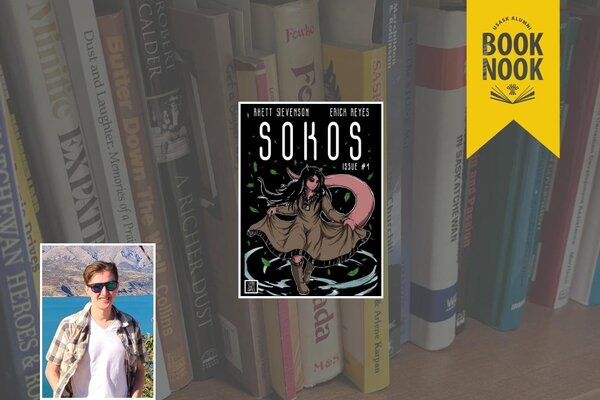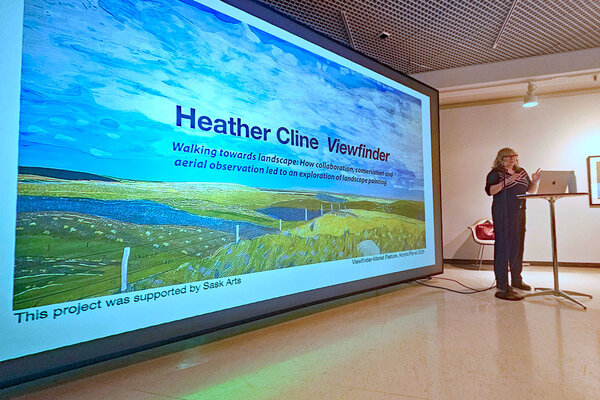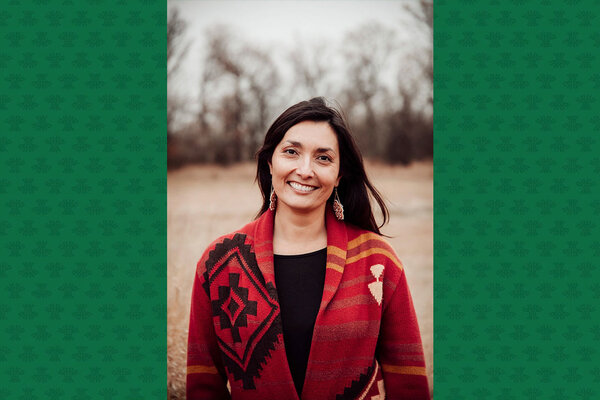
Award-winning USask alumna studies public understanding of space through literature
Dr. Jessica McDonald (BA'11, PhD'20) was among the seven recipients of Graduate Thesis Awards this spring who completed programs in the College of Arts and Science
By Shannon Boklaschuk
For Dr. Jessica McDonald (PhD), receiving a 2019/20 University of Saskatchewan (USask) Graduate Thesis Award was a highlight of her academic career.
The top award recognized McDonald’s work at the PhD level in the humanities and fine arts. She was among the seven recipients of Graduate Thesis Awards this spring who completed programs in USask’s College of Arts and Science.
“I was very happily surprised by the news,” said McDonald (BA’11, PhD’20), a two-time USask alumna who graduated with her doctoral degree from the College of Arts and Science’s Department of English in June. “And once I got over the shock, I mostly felt huge gratitude for having been nominated and for the generous, expert guidance of my supervisor, Dr. Lindsey Banco, and my committee members.”
McDonald is one of the Department of English’s most-accomplished graduates. As a Social Sciences and Humanities Research Council (SSHRC) doctoral fellow in the department, McDonald earned her PhD in 2019 after writing a dissertation entitled Complicated Geographies: Douglas Coupland’s North America. She then won a SSHRC postdoctoral fellowship, through which she is now working with Dr. Jeff Derksen (PhD) at Simon Fraser University in British Columbia.
Due to the COVID-19 pandemic, McDonald is currently conducting her postdoctoral research remotely while living in Saskatoon. Her research emerges from her doctoral work at USask in that she is continuing to think about how the politics of place shape, and are shaped, by literature.
“I’m actually really excited about this postdoctoral project because I’ve been thinking about and planning it for years, even in the early days of my doctoral program,” she said. “In the postdoc, I study depictions of so-called ‘non-places’—airports, chain stores, roads, and other sites of travel and consumerism—in Canadian fiction, poetry, and culture.”
During her time in USask’s Department of English, McDonald published three single-authored, peer-reviewed articles and, as part of her work on community-engaged scholarship, co-edited a special issue of Engaged Scholar Journal. Known as a talented teacher, an in-demand panelist, and a busy reviewer and editor, McDonald is engaged in every facet of her profession. Her commitment to teaching was recognized in 2018 when she received a USSU Instructional Support Award. She teaches regularly as a sessional lecturer at USask’s St. Thomas More College.
As a scholar, McDonald’s research has investigated the ways that literature can help people understand how to inhabit space more ethically—in other words, how literature can help us to generate, rather than inhibit, social and environmental justice. She has explored this by focusing on the prolific body of work by international best-selling Canadian author Douglas Coupland.
“In my dissertation, Complicated Geographies: Douglas Coupland’s North America, I ask: how can studying Coupland’s literary work contribute to more complex, critical, and dynamic understandings of North American space? What impact does literature like Coupland’s have on the way the public thinks about, and therefore uses, the lands, waters, and environments around us? My research as a whole takes a continental approach, in its use of North America as a framework, but each chapter is devoted to one key North American space represented by Coupland’s literature: the American Southwest desert region, Vancouver suburbia, British Columbia wilderness, Mexico, and the road,” she said.
“Each chapter uses Coupland’s literary representation of the locale in question to investigate the assumptions, problems, and possibilities underlying public understandings of these key spaces. My research argues that Douglas Coupland’s literature demands that we rethink how we use, inhabit, and ‘develop’ space across North America. His writing provokes us to consider how our give-and-take relationships with place influence environmental and social justice.”
McDonald said literature and the arts can sometimes be viewed as tangential to “real-world” concerns like climate change and the environment; the damages of colonialism and the rights of Indigenous people; the health and wellbeing of vulnerable populations; and other matters of social and environmental justice. Her research, however, sets out to show how this is emphatically not the case; indeed, she argues, our very attitudes and actions about such important real-world matters are shaped by the culture we consume—culture that includes literature.
“The fact of this influence means that the public needs to pay close attention to what ideas are circulating in the literature, film, and other cultural works we encounter. Studying literature is integral to understanding the world and the people around us,” McDonald said.
“We need only look to the many ‘gone-viral’ pieces released in online venues like Buzzfeed or Book Riotto see that the general public is already interested in learning about how culture can endorse, enforce, and critique existing social realities. In this age of near-constant media consumption, made even more possible by well-used storytelling/writing platforms like Wattpad, or by the popularity of Kindle e-books and the increasing ease of self-publishing, the public has become more and more aware that there are far-reaching ideological and material effects driven by the literature and culture we consume.
“There is more at stake than we might at first think in the bare act of reading a book. So, it is imperative that we study the culture we ingest in order to be aware of—and to question, critique, and learn from—the ideas we internalize through such culture.”
As a project that models how studying literature can teach us about the ethics of inhabiting space, McDonald believes her research has wide-ranging possibilities in terms of impact and relevance. The ethical insights about space that her research derives from literature can be used to generate ideological and material change not just in academia, but also in any area of society concerned with social and environmental justice, including policy and government, business, agriculture, education, and activism, she said.
For example, McDonald’s work illuminates how popular conceptions of the desert as barren may influence the use of the desert, such as how and when settlers colonized the lands of the American Southwest, or the installation of military initiatives, such as the southern Californian Edwards Air Force Base for aircraft testing, in the Mojave Desert.
“In sum, the impact of my research is in how it illuminates that we must investigate literature, and other cultural products that generate the public’s attitudes about space, in order to minimize environmental and social harms and to create livable and just future geographies,” she said.


